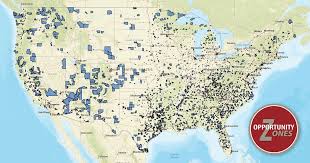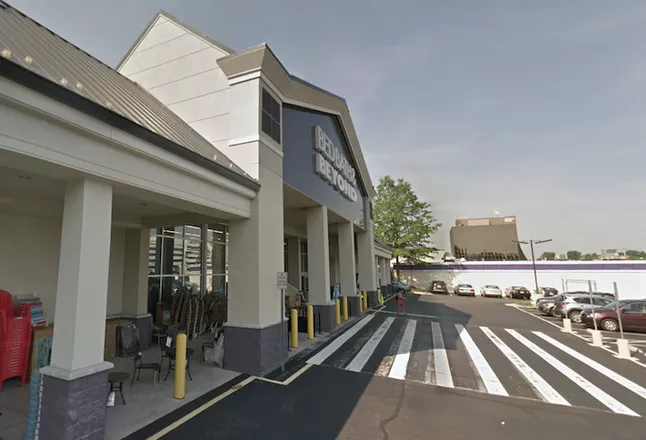Biden and his team contend that the program has fallen short of its promise of bolstering communities of color, small businesses, and homeowners.
John Egan
The federal Tax Cuts and Jobs Act of 2017 created the Opportunity Zone program, an initiative touted by the Trump administration as a vehicle for spurring investment in economically distressed pockets of the country. Today, more than 8,700 of these zones have been designated. As of the end of 2019, Opportunity Zone funds had collected more than $75 billion in private capital for an array of real estate projects.
The Trump administration hails the Opportunity Zone program as a success. A report released in August by the White House Council of Economic Advisers promoted the potential of these zones “to further prosperity and self-sufficiency in those areas that most lack it.”
Yet the incoming administration of President-elect Joe Biden believes the Opportunity Zone program itself is lacking. Biden and his team contend that the program has fallen short of its promise of bolstering communities of color, small businesses, and homeowners. Meanwhile, the Biden team insists, too many real estate investors are capitalizing on the program solely to line their pockets with cash. Biden’s campaign website cites an Urban Institute report that found the program is “not living up to its economic and community development goals.”
Experts believe that after Biden takes office in January, his administration—including Janet Yellen, his nominee to lead the U.S. Treasury Department and therefore oversee the Opportunity Zone program—will ratchet up federal scrutiny of the initiative. Yet these same experts doubt the new president will water down or ditch the program altogether.
“I know there’s a lot of noise about a new administration curtailing, or even shutting down, the [Opportunity Zone] program. But it’s not … wealthy clients who will be complaining. It will be thousands of mayors and 50 state governors objecting,” Blake Christian, a tax partner at Los Angeles-based accounting firm HCVT who specializes in Opportunity Zones, wrote in September. “Even though this is a federal program, most states have adopted it. Governors and mayors love the program. It doesn’t matter if they’re red or blue.”
In an interview, Christian notes that both Biden and Vice President-elect Kamala Harris have praised the Opportunity Zone program as an economic development tool. But they want to sharpen that tool by demanding more transparency into Opportunity Zone projects, he adds. Christian also foresees Biden and his allies pushing for a requirement that Opportunity Zone developments hire only workers who live in those zones.
“I’ve been doing this for 40 years and, by far, this is the most flexible and impactful economic development program that I’ve seen in my career,” Christian says. “It works really well for real estate, it’s way more flexible than a 1031 exchange and it’s fantastic for operating businesses.”
Opportunity Zone changes on the horizon
While it may be fantastic for some, the Opportunity Zone program needs to be reformed to benefit more economically disadvantaged Americans, according to Biden. On his campaign website, Biden outlines these steps he’d like to take:
- Require recipients of Opportunity Zone tax breaks to provide detailed information about their Opportunity Zone investments, including a project’s impact on poverty rates, housing affordability and job creation. A report released in November by the U.S. Government Accountability Office (GAO) noted that oversight of the program could be improved by beefing up collection of data about Opportunity Zones.
- Review Opportunity Zone benefits to ensure tax breaks for investors are authorized only if a project clearly yields economic, social, and environmental advantages for a community “and not just high returns—like those from luxury apartments or luxury hotels—to investors.”
- Provide incentives for Opportunity Zone funds to team up with non-profit or community-oriented organizations and produce a “community benefit plan” for each investment. Every plan would center on generating jobs for low-income residents and otherwise improving the finances of households within an Opportunity Zone.
In too many instances, Biden says, Opportunity Zone projects favor lucrative projects like high-end apartments over more community-minded projects like affordable housing.
“We cannot close the racial wealth gap if we allow billionaires to exploit Opportunity Zones tax breaks to pad their wealth, rather than investing in projects that benefit distressed low-income communities and Americans that are struggling to make ends meet,” the Biden campaign website declares.
Bipartisan backing
Biden could find support for his proposed Opportunity Zone reforms on both sides of the aisle in Congress, as Democratic and Republican lawmakers alike have filed legislation seeking to tighten regulation of the program.
“The beauty of Opportunity Zones is that they have a high level of bipartisan support,” says Joan Kramer, co-founder and principal of Los Angeles-based Mountain Pacific Opportunity Partners LLC, a firm established in 2019 to provide equity for real estate projects in Opportunity Zones, mostly in Western United States.
Kramer says she welcomes Biden’s desire to boost accountability in the Opportunity Zone program.
“I think you should question the motivations of anyone who looks for less transparency in any situation,” she says. “Why wouldn’t you want transparency? That is the key for us with our investors, and it should be a key for anybody involved with the program.”
Although Biden’s proposals would make it harder to meet the Opportunity Zone program’s compliance standards, Christian says he appreciates the “surgical” precision that the president-elect hopes to bring to it by ensuring more economically challenged people will reap gains— “and not just the millionaires and billionaires that are putting the money up.”
Opportunity Zone pace continues
The possibility of the Biden administration performing surgery on the Opportunity Zone program might get some investors “a little more spooked” about investing in these zones, Christian adds. But, he says, “it doesn’t seem to be happening.” He’s fielding lots of inquiries these days about Opportunity Zone investments.
Recent moves among Opportunity Zone investors underscore Christian’s experience:
- Irvine, Calif.-based investment manager Shopoff Realty Investments LP launched its first ever Opportunity Zone fund with a top fundraising target of $200 million. The fund will help build the $545 million, 450-room Dream Las Vegas hotel on the Las Vegas Strip.
- Minneapolis-based CliftonLarsonAllen Wealth Advisors LLC secured $23 million in Opportunity Zone funding for a mixed-use development in Columbia Heights, Minn. The $60 million project will feature 265 market-rate apartments and 20,650 sq. ft. of office and meeting space. Residential real estate developer Alatus LLC, also based in Minneapolis, is spearheading the project.
- PTM Partners LLC, a New York City-based real estate investor and developer that specializes in Opportunity Zone properties, closed its second Opportunity Zone fund at $40 million. With this fund, PTM is targeting $250 million of capital for Opportunity Zone developments across the country.
At Kramer’s firm, Mountain Pacific, four Opportunity Zone projects are underway now, and another three are in the pre-development stage.
Mountain Pacific raises capital on a deal-by-deal basis for developments in the multifamily, seniors housing, student housing and self-storage sectors. The firm characteristically garners equity from high-net-worth individuals and family offices, with a typical investment ranging from $5 million to $15 million, Kramer says.
Looking ahead
As Biden prepares to move into the White House, Kramer is optimistic about the future of the Opportunity Zone program, despite the possibility of lingering economic pain caused by the coronavirus pandemic.
For his part, Christian thinks the Opportunity Zone program could aid the recovery from the pandemic-triggered recession. In fact, he proposes expanding the number of Opportunity Zones—perhaps by 20 percent—to support economic recovery and broadening by 90 to 270 days the window of time allowed for an investor to put money into an Opportunity Zone fund.
The Opportunity Zone changes outlined by Biden wouldn’t affect the program’s underlying economic or tax incentives, according to Scott Meyer, managing principal of PTM Partners. Therefore, investors should remain confident about depositing money into Opportunity Zone funds, he says.
As we move into 2021, Meyer expects Biden to place less emphasis on attracting capital for Opportunity Zones and more on his stated intent of incentivizing investor-fueled benefits for the communities within these zones.
“This year, the pandemic disproportionately impacted lower-income communities,” Meyer says. “Given the trillions of federal stimulus dollars recently injected into the financial system, policymakers are becoming increasingly supportive of ways to support communities in need without increasing levels of debt. With this, the Opportunity Zone program should become a key tool in jumpstarting investment and equitable development in otherwise overlooked areas and help them rebound in 2021 and beyond.”






